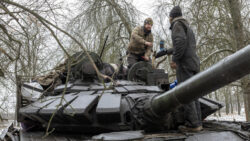Ukraine’s Volodymyr Zelensky said the situation on the front lines in the east of the country was getting tougher, with Russia throwing more and more troops into battle, hours after the two sides agreed to exchange dozens of prisoners of war. Earlier on Saturday, Ukrainian officials said a serious accident at a high-voltage substation had caused widespread power outages in and around the southern port city of Odesa, leaving half a million people without power. Follow our live blog for all the latest developments. All times are Paris time (GMT+1).
7:50pm: Russia putting ‘more and more forces’ into Donbas battle, says Zelensky
Ukrainian President Volodymyr Zelensky says the situation on the front lines in the east of the country is getting tougher, with Russia throwing more and more troops into battle.
Russian forces are slowly gaining ground in the Donbas region, encircling the city of Bakhmut north of Donetsk and battling to take control of a nearby road which is a major supply route for Ukrainian forces. They are also trying to capture Vuhledar, southwest of Donetsk.
“I’ve often had to say the situation at the front is tough, and is getting tougher, and it’s that time again. … The invader is putting more and more of his forces into breaking down our defences,” Zelensky said in a video address. “It is very difficult now in Bakhmut, Vuhledar, Lyman and other directions,” he added.
Earlier in the day, Deputy Defence Minister Hanna Malyar wrote on Telegram that Russian efforts to break the defences in Bakhmut and Lyman had failed.
6:05pm: Half a million people without power in Odesa area
The accident at an electrical substation previously damaged by Russian strikes has left half a million households without power in the southern Ukrainian city of Odesa, authorities have said.
“The situation is complex, the scale of the accident is significant,” Prime Minister Denys Shmygal said on messaging app Telegram. He added that the substation had been “repeatedly” damaged as a result of Russian strikes.
Odesa region governor Maksym Marchenko described the accident as “serious,” adding that the energy minister and the head of state-run electricity grid operator Ukrenergo had been sent to the city.
“A number of generators will be delivered to the region of Odesa within the next 24 hours,” he said. “We expect the first generators to arrive tonight.”
4:15pm: Zelensky, UK’s Sunak discuss expanding Ukraine’s military capabilities
Ukraine’s President Volodymyr Zelensky said he discussed the “further expansion of capabilities” of Ukraine’s military in a call with British Prime Minister Rishi Sunak.
Zelensky said he also thanked Sunak for the start of a training programme for Ukrainian crews that will operate Challenger 2 tanks, which Britain pledged to send to Ukraine last month.
In a statement, Sunak’s office said the prime minister was “focused on ensuring the UK’s defensive military equipment reached the front line as quickly as possible.”
The statement added: “Both leaders agreed that it was vital that international partners accelerated their assistance to Ukraine to help seize the opportunity to push Russian forces back.”
3:50pm: WHO report on Ukraine health emergency sparks US-Russia row
The United States and Russia have sparred over a World Health Organization report on the humanitarian crisis in Ukraine, with Moscow saying it was politically motivated and Washington calling for it to be swiftly updated.
The report documented more than 14,000 civilian casualties, with 17.7 million people in need of humanitarian assistance and 7.5 million Ukrainian refugees displaced across Europe.
Of 471 attacks with heavy weapons on healthcare facilities globally, 448 occurred in Ukraine, said the report, which covered events in the first nine months of 2022.
Russia’s representative to the WHO board called it politicised and one-sided and described its references to Ukraine as unfounded accusations – whereas Sheba Crocker, the US representative to the United Nations, called for an updated report to document incidents in Ukraine since September.
3:05pm: Cult Soviet-nostalgia band Russkaja breaks up over safety fears
The Austrian ska-punk band Russkaja, which has been surfing Soviet nostalgia in Vienna for two decades, has announced its break-up amid “fears for the safety of our team” following Russia’s invasion of Ukraine.
The seven-member band, which includes a Russian and Ukrainian, enjoyed great success in the United States with its blend of “Russian Turbo Polka Metal”.
“Presented as pro-Russian despite our condemnation” of the invasion of Ukraine, “our group Russkaja has become a daily target on the Internet”, the band said on Facebook. “The Soviet imagery is forever damaged” and “the war in Ukraine that Russia started on February 24, 2022 no longer allows us to use it satirically,” Russkaja wrote.
The band had initially decided to continue performing while clearly showing its support for Kyiv. But some of its lyrics – such as “the Russians have landed” – had to be rewritten, while the band’s red-star logo and Moscow-born lead singer had been the subject of mounting criticism.
1:55pm: Bodies of British volunteers who died in Eastern Ukraine returned
The Ukrainian president’s chief of staff Andriy Yermak said the bodies of British volunteer aid workers Andrew Bagshaw and Chris Parry had been sent back to Ukrainian authorities.
Bagshaw and Parry were killed during an attempted humanitarian evacuation in eastern Ukraine in January, Parry’s family has previously said.
1:30pm: Major accident causes power outages in southern city of Odesa, Ukrainian PM says
A serious accident at a high-voltage substation in Ukraine’s Odesa region has caused emergency power outages in the regional capital, Ukraine’s Prime Minister Denys Shmyhal said on Saturday.
“The situation is difficult, the scale of the accident is significant, it is impossible to quickly restore power supply, in particular to critical infrastructure,” Shmyhal wrote on Telegram.
He said the substation had previously been damaged multiple times by Russian missile strikes.
12:05pm: Portugal to send German-made Leopard tanks to Ukraine, PM says
Portugal will send Leopard 2 tanks to Ukraine, Prime Minister Antonio Costa said on Saturday, without specifying how many will be shipped. Costa added that Portugal is in talks with Germany to obtain parts needed for the repair of a number of inoperable Leopard tanks in Portugal’s inventory of the weapon.
“We are currently working to be able to dispense some of our tanks,” Costa told Lusa news agency during a trip to the Central African Republic. “I know how many tanks will be (sent to Ukraine) but that will be announced at the appropriate time.”
Admiral Ant?nio Silva Ribeiro, the head of the Portuguese armed forces, said last month Portugal had 37 Leopard 2 tanks but it has been widely reported by local media that most are inoperable.
11:23am: Russia, Ukraine confirm dozens of soldiers freed in prisoner swap
Dozens of Russian and Ukrainian prisoners of war have returned home following a prisoner swap, officials on both sides said Saturday.
Top Ukrainian presidential aide Andriy Yermak said in a Telegram post that 116 Ukrainians were freed. He said the released POWs include troops who held out in Mariupol during Moscow’s month-long siege that reduced the southern port city to ruins, as well as guerrilla fighters from the Kherson region and snipers captured during the ongoing fierce battles for the eastern city of Bakhmut.
Russian defence officials, meanwhile, announced that 63 Russian troops had returned from Ukraine following the swap, including some “special category” prisoners whose release was secured following mediation by the United Arab Emirates.
A statement issued Saturday by the Russian Defence Ministry did not provide details about these “special category” captives.
9:36am: EU pledges more support for Ukraine, as Zelensky pushes for fast-track membership
The European Union offered strong support for Ukraine at a summit in Kyiv as air raid sirens wailed on Friday, but set “no rigid time lines” for its accession to the wealthy bloc.
President Volodymyr Zelensky had hoped the EU would put Ukraine on a rapid road to membership. He used the summit to step up calls for allies to deliver long-range weapons to help repel Russian forces besieging the city of Bakhmut and occupying much of the eastern Donbas industrial region.
Speaking in a video address after the summit, Zelenskiy said, “we have an understanding that it will be possible for Ukraine to start EU accession negotiations this year”. But at the summit itself there was no promise of fast-track membership and the EU’s next package of sanctions on Russia, its 10th, is expected to fall short of Kyiv’s expectations.
Kyiv applied to become an EU member shortly after the invasion began and wants to start formal accession talks as soon as possible, as FRANCE 24’s Gulliver Cragg reports from Kyiv:
4:24am: US allows seized Russian money to go to Ukraine aid
Attorney General Merrick Garland said Friday that he had authorised the United States to begin using seized Russian money to aid Ukraine, according to US media.
The announcement came during a meeting between Garland and Ukrainian Prosecutor General Andriy Kostin in Washington, nearly one year after Moscow’s invasion of its former Soviet neighbour. “Today, I am announcing that I have authorised the first-ever transfer of forfeited Russian assets for use in Ukraine,” Garland said, according to CNN.
The money will come from assets confiscated from Russian oligarch Konstantin Malofeyev after his indictment on sanctions evasions in April, he added. The money will go to the State Department “to support the people of Ukraine,” CNN reported Garland as saying.
Kostin welcomed the move, which he said would see $5.4 million of confiscated assets go toward “rebuilding Ukraine.”
10:49pm: EU, G7, Australia reach deal on price caps for Russian fuel
European Union member states, the Group of Seven industrialised countries and Australia said Friday that they have reached an agreement on price caps for Russian petroleum products, an attempt to target Russian President Vladimir Putin’s key exports and limit his assault on Ukraine.
The caps involve two price levels, $100 per barrel for more expensive fuel like diesel and $45 on lower-quality products such as fuel oil, according to officials. The price caps on those transported products work by establishing a ceiling for the cost of fuel that can be transported on ships.
The EU in December imposed an embargo on Russian crude oil coming in by sea and — together with its G7 partners — set a $60-dollar-per-barrel cap for exports around the world. The second embargo, on Russian fuel, is set to come into force on Sunday or soon after. It targets Russian refined oil products such as petrol, diesel and heating fuel, arriving on ships.
At the same time, the EU and the G7 group of wealthy democracies have also agreed to impose a price cap on Russian shipments of those products to global markets.
(FRANCE 24 with AFP, AP and Reuters)
(C) France M?dias Monde graphic studio





